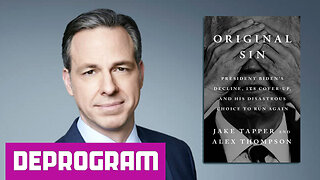Premium Only Content

Episode 3070: Book of the Bible - Amos
Books of the Bible: Amos
Let Justice Roll: The Cry of Amos in a Modern World
Welcome to Catholic Reboot, the podcast where we revive timeless truth in a time of relentless change. I’m your host, and today, we turn to a prophet whose voice echoes with the clarity of judgment and the call to conversion the shepherd-prophet Amos.
Though one of the so-called Minor Prophets, Amos's message is anything but minor. It resounds with the thunder of divine justice and the lament of a God betrayed by His people. In our modern era of spiritual lukewarmness, Amos speaks again: not just to Israel of old, but to the Church today especially the Church in crisis.
Let us begin with Prayer.
In the name of the Father, and of the Son, and of the Holy Ghost. Amen.
Come, Holy Ghost, fill the hearts of Thy faithful and enkindle in them the fire of Thy love. Send forth Thy Spirit, and they shall be created, and Thou shalt renew the face of the earth.
O God, who didst instruct the hearts of the faithful by the light of the Holy Ghost, grant that by the same Spirit we may be truly wise and ever rejoice in His consolation. Through Christ Our Lord. Amen.
Mary, Queen of Prophets, pray for us.
St. Amos, faithful servant of divine justice, intercede for us.
In the name of the Father, and of the Son, and of the Holy Ghost. Amen.
Who Was Amos?
Amos was not born into the line of prophets. He was a simple herdsman, a gatherer of sycamore fruit, a man of the fields from Tekoa in Judah. Yet the Lord called him, and that calling was enough.
"I was no prophet, nor prophet's son, but I was a herdsman and a dresser of sycamore trees. And the Lord took me as I followed the flock, and the Lord said to me, 'Go, prophesy to my people Israel.'" (Amos 7:14-15)
God calls whom He wills. Think of St. Peter, a fisherman; St. Bernadette, an uneducated girl; or St. Juan Diego, a humble indigenous convert. The prophetic mission is not about credentials but about fidelity.
Amos prophesied during the reign of Jeroboam II in the 8th century B.C. Israel was prospering economically, but it was spiritually decaying. Luxury abounded, but so did idolatry, injustice, and moral compromise. Does this sound familiar? The Church in the West is materially rich, but spiritually impoverished. Amos has a word for us.
The Cry Against Injustice
The heart of Amos's message is clear: Divine worship cannot be separated from justice.
"Hear this, you who trample upon the needy, and bring the poor of the land to an end..." (Amos 8:4)
The prophet speaks against the social sins of his day: the exploitation of the poor, dishonest business practices, and indulgent living by the elites. The cries of the poor had reached Heaven.
"Woe to you that are wealthy in Zion... you that sleep upon beds of ivory... you drink wine in bowls... but are not grieved for the affliction of Joseph." (Amos 6:1-6)
St. Basil the Great once said: "The bread which you do not use is the bread of the hungry; the garment hanging in your wardrobe is the garment of him who is naked."
This does not endorse class warfare. It is a reminder of the Catholic teaching on the universal destination of goods, subsidiarity, and the moral obligations of wealth. Pope Leo XIII in Rerum Novarum insists that property is a natural right, but one that carries duties to the common good.
How many today speak of justice without truth? Or truth without justice? Amos calls us to both.
Worship Without Heart
Perhaps the most striking indictment in the Book of Amos comes against the external practice of religion while the heart remains corrupted.
"I hate, I despise your feasts, and I take no delight in your solemn assemblies... Take away from me the noise of your songs; to the melody of your harps I will not listen. But let justice roll down like waters, and righteousness like an ever-flowing stream." (Amos 5:21-24)
What is this but a denunciation of liturgical formalism? We are reminded of Our Lord quoting Isaiah: "This people honors me with their lips, but their heart is far from me."
Traditional Catholics must take heed. The Latin Mass is beautiful, and reverent liturgy is vital. But it must never be reduced to mere aesthetics. The beauty of the Mass must correspond with a heart that is converted, humble, and obedient to God.
The saints loved the Mass because they loved Christ. If we cling to the Mass but not to virtue, we risk becoming like those whom Amos condemned.
The Day of the Lord
Amos also speaks of the coming "Day of the Lord."
"Woe to you who desire the day of the Lord! Why would you have the day of the Lord? It is darkness, and not light..." (Amos 5:18-20)
Many Israelites believed the Day of the Lord would be a day of vindication and national triumph. Amos corrects them. It will be a day of judgment.
This prefigures the Final Judgment. We must not presume upon salvation. Frequent reception of the sacraments without repentance leads to condemnation.
St. Paul writes, "Work out your salvation with fear and trembling." (Philippians 2:12)
Fear of the Lord is a gift of the Holy Ghost. It is not servile fear, but reverent awe. Amos calls us to examine our consciences. Are we truly prepared for the Day of the Lord?
Hope for the Remnant
Yet Amos does not end in despair. The final chapter speaks of restoration.
"In that day I will raise up the booth of David that is fallen... and I will repair its breaches and raise up its ruins." (Amos 9:11)
This is a messianic prophecy. The Fathers saw this fulfilled in Christ, and in the Church He founded. Even amidst judgment, God preserves a faithful remnant.
As Traditional Catholics, we often feel like that remnant. We see apostasy, liturgical abuse, and doctrinal confusion. But we are not alone.
Our Lord said, "Fear not, little flock, for it is your Father's good pleasure to give you the Kingdom." (Luke 12:32)
God restores, not by compromise, but by fidelity. The restoration of Israel begins with the restoration of worship and obedience.
Practical Reflections for Today
Let us draw out a few points of examination:
1. Do I live a life of justice? Am I honest in business, charitable in judgment, generous with the poor?
2. Do I attend the sacraments with humility? Or do I treat them as a ritual checkbox?
3. Do I support true shepherds? Or am I indifferent to the crisis in the Church?
4. Do I cling to Christ and His Church in fidelity? Or do I seek comfort without the Cross?
We must be the Amos of our time. We must speak truth. We must live virtue. We must uphold Tradition.
Now lets break this book down into its respective chapters.
CHAPTER 1: The Lion Roars
Amos begins with thunder. He proclaims judgment not only on Israel but on its neighbors: Damascus, Gaza, Tyre, Edom, Ammon, and Moab. These nations are condemned for brutalities against the innocent war crimes, slavery, and merciless violence.
“The Lord will roar from Sion, and utter his voice from Jerusalem” (Amos 1:2).
Reflection:
God is not silent. He roars with righteous anger when His image-bearers are crushed. From a Traditional Catholic lens, this reminds us that God’s justice is universal, not reserved solely for His people. Every nation, even those outside the covenant, will be judged by natural law, written on the heart (cf. Romans 2:15).
CHAPTER 2: Israel’s Greater Guilt
The chapter begins by concluding judgment on Moab, then moves to Judah and Israel. Judah is judged for rejecting God’s law. Israel is judged more severely for oppressing the poor, engaging in sexual immorality, and corrupting the innocent.
“They sell the just man for silver, and the poor for a pair of shoes” (Amos 2:6).
Reflection:
Injustice within God's covenant people is more grievous than pagan sin. The Church, especially its hierarchy, will be judged more harshly (cf. Luke 12:48). When clergy commit scandal, when Catholic politicians support abortion or gender ideology, it is not merely sin it is betrayal of the Truth entrusted to them.
Pope St. Pius X wrote in E Supremi (1903):
“We must be vigilant... the greatest danger lies in those who, while bearing the name of Catholics, live in a manner wholly opposed to it.”
CHAPTER 3: God Reveals His Plans to His Prophets
Amos explains the logic of prophecy: if disaster comes, it is not by accident. God acts with purpose and warns His people through the prophets.
“The lion shall roar, who will not fear? The Lord God hath spoken, who shall not prophesy?” (Amos 3:8).
Reflection:
God does not surprise His people. From the warnings of Noah to the apparitions at Fatima, God speaks. Do we listen?
Amos stands in a long line of prophets culminating in Our Lord Himself. As Traditional Catholics, we must treasure prophecy not private revelations that confuse but the prophetic role of Sacred Scripture, Sacred Tradition, and the Church’s Magisterium when faithful to its foundations.
CHAPTER 4: The Luxury of the Damned
Amos spares no words for the women of Samaria, whom he calls “cows of Bashan,” a poetic insult for their indulgence and oppression of the poor. Despite past chastisements famine, drought, plague the people did not repent.
“Yet you returned not to me, saith the Lord” (Amos 4:6–11).
Reflection:
Prosperity often breeds forgetfulness of God. Like modern societies, Israel ignored divine correction, attributing everything to chance or science.
This chapter exposes a truth ignored in today’s Church: God punishes to bring about conversion. Our Lady at La Salette warned of chastisements if people did not repent. To ignore divine justice is to mock divine mercy.
CHAPTER 5: Seek the Lord and Live
This is the centerpiece of Amos's message. A call to repentance, paired with searing denunciations of false worship.
“Seek the Lord, and live... I hate and have rejected your festivities” (Amos 5:6, 21).
“Let judgment roll down as waters, and justice as a mighty stream” (5:24).
Reflection:
Worship without obedience is worthless. This verse is often quoted but rarely understood. Amos isn’t rejecting worship he’s demanding that it be authentic, reverent, and united to justice.
The Latin Mass offers us a model: sacred, humble, penitential. But we must not become Pharisees loving the rite but ignoring the poor, gossiping about others, or living pridefully. True religion integrates liturgy, doctrine, and virtue.
CHAPTER 6: Woe to the Complacent
“Woe to you that are wealthy in Sion... you that sleep upon beds of ivory... and are not grieved for the affliction of Joseph” (Amos 6:1, 4, 6).
This is a direct blow against comfortable Catholics especially those who refuse to acknowledge crisis in the Church. Israel’s elite partied while the nation rotted.
Reflection:
Complacency is a spiritual cancer. How many Catholics today refuse to believe the Church is in crisis? That souls are being lost through confusion, error, and indifferentism?
St. John Fisher, alone among English bishops, stood against Henry VIII. Amos, too, stood alone. We are called to stand firm, even if isolated, for the sake of God’s glory and His faithful remnant.
CHAPTER 7: Visions and Rejection
Amos sees three visions: locusts, fire, and a plumb line. God measures His people and finds them wanting. Then comes a confrontation with Amaziah, the false priest.
“Go, flee into the land of Judah, and eat bread there... but prophesy no more in Bethel” (Amos 7:12–13).
Amos responds by reaffirming his divine commission.
Reflection:
False religious leaders always oppose true prophecy. In our own day, many bishops persecute Traditional Catholics while tolerating heterodox ideas. Like Amaziah, they fear disruption of their power.
Yet Amos models courage. As did Archbishop Lefebvre in our own time who bore exile and slander for fidelity to the Faith.
________________________________________
CHAPTER 8: A Basket of Summer Fruit
God shows Amos a basket of ripe fruit a symbol that the end is near. The people continue to cheat the poor and profane the Sabbath.
“Behold, the days come... I will send a famine in the land not a famine of bread, nor a thirst for water, but of hearing the word of the Lord” (Amos 8:11).
Reflection:
This verse pierces the heart. Could there be any greater chastisement than a Church where truth is no longer preached, and souls starve?
We are in such a time now. The famine of truth afflicts dioceses, seminaries, and even Rome. The answer is not despair but deeper fidelity. Cling to the Catechism of Trent, the 1962 Missal, the writings of the saints.
CHAPTER 9: Restoration and Hope
Finally, the prophecy turns to hope. Judgment will fall but not forever.
“I will raise up the tabernacle of David that is fallen” (Amos 9:11).
God promises to restore a faithful remnant and bless the land once again.
Reflection:
This prophecy points to Christ and His Church. Though the Old Israel failed, the New Israel founded on Peter is eternal. And even in crisis, the Church will endure. God will raise up holy priests, families, and orders.
Pope Benedict XVI once said that the Church would become smaller, poorer, but purer. That is the remnant Amos saw and we are called to be part of it.
Ending Prayer
O Lord, You sent Amos to shake Your people from their slumber. Shake us also, O Lord, from complacency. Stir our hearts with holy fear and holy zeal. Grant that we, faithful to Your Word and Your Sacraments, may be lights in a dark age. O Lord. And may we, through the intercession of the Immaculate Virgin Mary, stand firm in the day of Your visitation.
In the name of the Father, and of the Son, and of the Holy Ghost. Amen.
-
 9:21
9:21
Dr Disrespect
17 hours agoMOST INSANE 110 ASSIST Game in Battlefield 6
39.6K7 -
 2:56:34
2:56:34
Side Scrollers Podcast
18 hours agoTwitch PROMOTES DIAPER FURRY + Asmongold/Trans CONTROVERSY + RIP Itagaki + More | Side Scrollers
40.1K6 -
 23:30
23:30
GritsGG
14 hours agoThis Burst AR Still SLAMS! BR Casual Solos!
6.42K1 -
 1:27:43
1:27:43
DeProgramShow
3 months agoEXCLUSIVE on DeProgram: “A Live Interview with Jake Tapper”
3.81K2 -
 1:25:15
1:25:15
The HotSeat
14 hours agoHere's to an Eventful Weekend.....Frog Costumes and Retards.
9.43K8 -
 LIVE
LIVE
Lofi Girl
2 years agoSynthwave Radio 🌌 - beats to chill/game to
135 watching -
 1:34:23
1:34:23
FreshandFit
12 hours agoThe Simp Economy is Here To Stay
140K10 -
 19:35
19:35
Real Estate
14 days ago $1.85 earnedMargin Debt HITS DANGEROUS NEW LEVEL: Your House WILL BE TAKEN
8.05K3 -
 4:03:48
4:03:48
Alex Zedra
8 hours agoLIVE! Battlefield 6
43.6K2 -
 2:03:15
2:03:15
Inverted World Live
10 hours agoProbe News: 3I Atlas is Spewing Water | Ep. 125
119K23